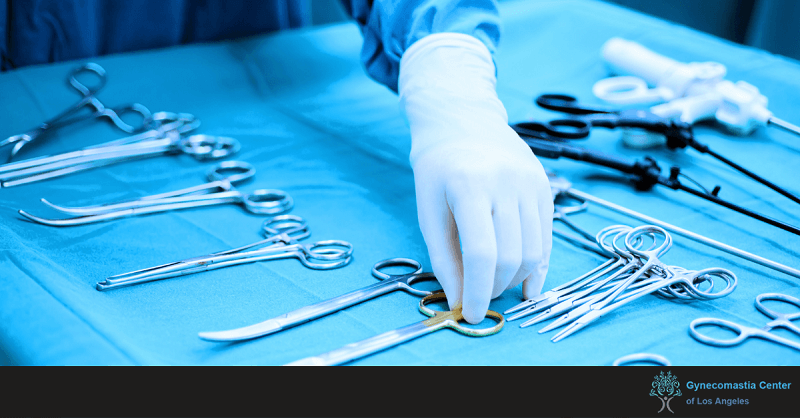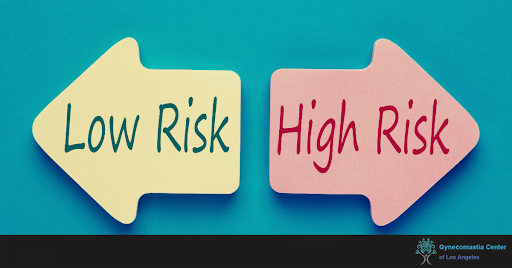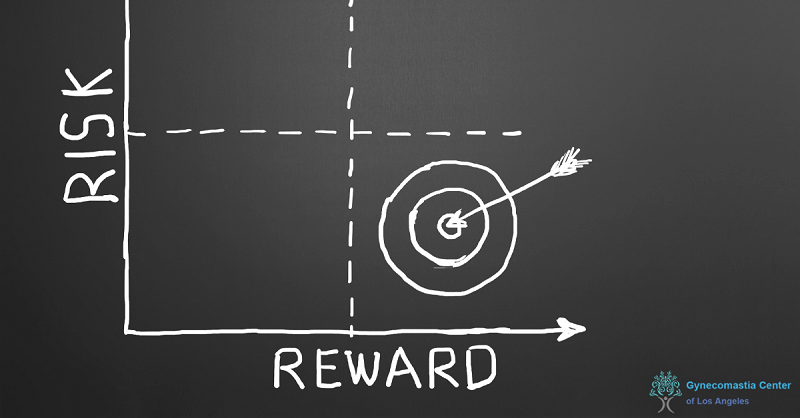Male breast development is never easy for a man to face and the risks of Gynecomastia surgery. Whether the breasts grew during puberty or later in life, it’s likely the excess tissue has caused great psychological pain. Not being able to take your shirt off out of fear of judgment or mockery is only half of it.
When a man looks around and sees other men with normal chests, gynecomastia can make a man feel less manly and just plain disfigured as a result. Fortunately, a gynecomastia cure does exist.
In addition to asking about how to get rid of gynecomastia, patients often have one question when sitting down with their surgeon for the first time. That question has to do with gynecomastia surgery risks. More specifically, patients want to know if there are any risks of complications during the procedure or after?

Possible Gynecomastia Surgery Risks
Bleeding
While rare, there is a chance that you could experience excessive bleeding during or after the procedure. If bleeding occurs after surgery, you may require emergency treatment to drain the accumulation of blood. A blood transfusion can help to replenish the blood that you’ve lost. Ask your surgeon about emergency protocols if a serious complication such as bleeding occurs.
Risks of Anesthesia
Gynecomastia surgery is usually performed under IV anesthesia, which means you will be able to follow commands but are not likely to recall much about the surgery afterward. Risks to your health on account of anesthesia are rare. You will have an anesthesiologist monitoring your vital signs during and immediately after surgery to ensure the drugs work properly without harming your health.
Cardiac and Pulmonary Complications
Cardiac complications are common with all surgeries involving anesthesia. Blood clots and partial collapse of the lungs are also possible, though these conditions are extremely rare. Contact your gynecomastia surgeon right away if you experience chest pain, shortness of breath, unusual heart beats, or leg swelling immediately following surgery.
Breast Irregularities
After surgery, you may notice breast and nipple shape changes, as well as alterations to the size and symmetry of your male breasts. Your surgeon will discuss your expectations with you. It is important that you maintain realistic expectations so that you are happy with your results. Ask to see before and after photos of previous patients to gauge their outcomes.
Doing so can help you determine if your vision for the ideal chest results is in fact possible.

Damage to Breast Structures
During the gynecomastia procedure, there is the potential for injury to the deeper structures of the breast. These structures can include the blood vessels, nerves, muscles, and your lungs. These injuries may be temporary or permanent.
Infection
All surgeries come with a risk of possible infection. In reality, infection risk remains low in today’s modern medical facilities. Every precaution is taken to ensure the sterilization of the environment, including all tools and equipment used during surgery. You will also receive gynecomastia surgery recovery instructions for proper wound care while recovering at home to keep dangerous infections at bay.
Persistent Pain
There’s no sugarcoating it; you will experiencpufe some amount of pain following your surgery. Your gyno surgeon will make every accommodation to ensure you have prescription or over the counter medication to minimize your discomfort as you heal.
The level of pain you experience may vary. In rare instances, you can experience chronic pain that results from the nerves becoming trapped in scar tissue or your breast tissue stretching.
Poor Wound Healing
Delayed wound healing (wound disruption) is possible following gynecomastia surgery. Some areas around the treatment site may heal normally while others may take ages to heal. In rare cases, areas of the skin may die. If this happens, the treatment area will require more frequent dressing changes. In super rare cases, follow up surgery will become necessary to remove the unhealed tissue.
Note that smokers have a greater risk of poor wound healing and skin loss following a gyno procedure. Consider quitting smoking at least two weeks before surgery to mitigate these health risks.
Changes in Nipple and Skin Sensitivity
In some cases, surgery can cause you to experience a diminished sensitivity in your nipples. This condition can also affect the skin of one or both breasts. While normal sensation does tend to return after several months, you may occasionally see changes to the sensitivity occur over time.
Partial or permanent loss of nipple and skin sensation are possible. These effects of gyno surgery may affect sexual response. In very rare cases, the nipple may be lost altogether.
Fluid Accumulation
Also referred to as seroma, fluid may accumulate between the skin and underlying tissues following surgery. This issue can also occur following trauma and vigorous exercise. Your gyno surgeon may need to drain the fluid if too much accumulates. Ask your doctor about the use of tubes during and after surgery to control drainage issues.
Possibility of Gyno Revision Surgery
Another rare occurrence is when the patient requires additional surgery to tighten or reposition the breasts. The practice of medicine and surgery is by no means an exact science. While good results are expected, there is no guarantee that you will receive the intended results.
In some cases, it might not be possible to achieve optimal results with a single procedure. Your doctor may discuss the option of follow-up surgery with you during your check up if it ends up being a concern.
Adverse Reaction to Surgical Materials
Some patients experience an allergic reaction to objects used during surgery, such as suture material, glues, topical preparations, injected agents, and blood products. Severe reactions are possible, such as serious systemic reactions in response to drugs used during surgery. Any allergic reactions that do occur may require additional treatment.
Unattractive Scarring
All surgeries involve scars to some degree. Some post-surgical scars are more visible than others. Your gynecomastia surgeon is aiming for good wound healing, which will leave some scarring behind. Your doctor can hide scars within the natural folds of your body, leading to scarring that is nearly invisible once fully healed.
In rare cases, abnormal scars may develop within the skin and surrounding tissues. These scars may appear unsightly and may require additional surgical revision or treatment to get rid of them after the initial procedure.
Unfavorable Results
While good aesthetic results are expected, there is no guarantee that you will receive the results you had in mind. You may find yourself disappointed with the appearance of your chest following surgery.
This can occur due to asymmetrical gynecomastia, the location of the nipple, or unanticipated breast shape or size. For these types of situations, gyno revision surgery may be necessary to improve your results.
Additional Breast Reduction Risk Information
The following information deals with increased risks to your health based on certain behaviors, such as the taking of medication or smoking. Your doctor will mention all of these during your first sit-down consultation. Be sure to heed your doctor’s advice for optimal surgical outcomes.
Smoking

Medications and Herbal Supplements
Your male gyno surgeon will ask about any medications or supplements you’re taking. There are potential adverse reactions that can occur as a result of the ingestion of certain drugs. These can even include over-the-counter medicines like aspirin and ibuprofen. Also included on the list of medications to avoid taking before surgery include non-steroidal and anti-inflammatory medicines like Advil, Aleve, and Motrin.
Your doctor will also encourage you to stop taking drugs that interfere with blood platelets, such as Plavix, which is usually prescribed following a stent. Be sure to mention to your surgeon that you are taking Plavix and that you have a stent, if that is the case.
Your doctor will advise you which medications and supplements to stop taking and if it’s safe to do so for proper health management.
Exposure to the Sun
After gyno surgery, be careful of getting too much sun. Whether natural or from a tanning bed, ultraviolet radiation can increase scarring and lead to poor healing. You may also experience color changes, even when using sun block and covering up with clothing. Ask your surgeon when it’s safe to tan after surgery and heed to his or her advice for best results.
Travel Plans
Having gynecomastia surgery, like any procedure, may delay your return to normal life, at least for a while. Let your gyno surgeon know of any plans you have to travel domestically or internationally. There are no guarantees that you will be able to resume all of your usual activities within the timeframe you desire.
Intimate Relations
Surgery involves the coagulation of certain blood vessels. If you engage in activity that increases your pulse or heart rate, you risk opening these vessels, which in turn can lead to bleeding (hematoma). It is recommended that you refrain from physical activities of any kind until your gyno surgeon deems it safe.
All Risks Will Be Discussed During Your Initial Consultation

Many of the gynecomastia surgery risks are similar to the risks of all other surgeries. The fact is, and according to the American Society of Plastic Surgeons, gynecomastia surgery is incredibly safe. Most patients who undergo a gyno procedure have smooth and uncomplicated recoveries.
While the above risks can be frightening, you are far more likely to experience things like bruising and slight discomfort as you heal. You can mitigate the risks to your health during surgery and afterward by choosing a gynecomastia surgeon with meticulous surgical technique, such as the esteemed Dr. Babak Moein of Los Angeles, California.
Dr. Moein has been performing minimally-invasive procedures like gyno surgery for over two decades. The doctor is compassionate and personable, and dedicated to helping you achieve your aesthetic ideal.
If you have gynecomastia, and your “man boobs” have been troubling you for some time, there is no better time than the present to stop the emotional distress. If you are worried about any potential risks, a consultation with Dr. Moein can help ease your mind. He offers telehealth consultations for your convenience and would be happy to meet with you virtually or in person.
Dr. Moein can answer your questions and alleviate your concerns. He can also inform you of the results you can expect by having gynecomastia treatment.
Can you envision a more masculine chest without a hint of male breasts? That chest could be yours by contacting our gynecomastia doctors the Gynecomastia Center of Los Angeles.
Fill the form below or Call us at +1-310-694-4486 to discuss your gyno problem and schedule a consultation with Dr. Moein In & Near Los Angeles.
If this post was helpful to you, please leave us a 5star review. It would help us a lot. Thanks!

Dr.Babak Moeinolmolki
LA Cosmetic Surgeon Dr. Moein is board-certified by the American Board of General Surgery.
